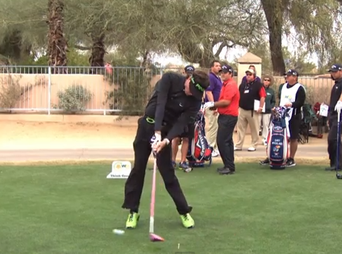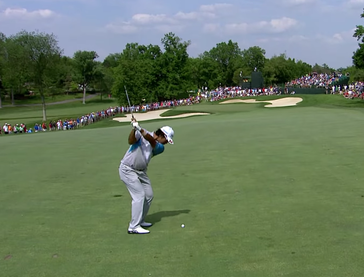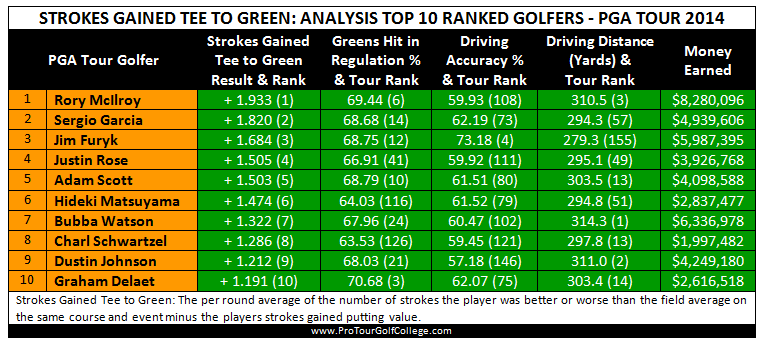 Bubba Watson Ranked Number 1 in Which Important Stat in 2014? Bubba Watson Ranked Number 1 in Which Important Stat in 2014? There is one statistic that will guarantee that a player will earn US 2 million dollars or more in a year on the PGA tour. The catch is that you have to be in the top ten of the new Strokes Gained Tee-to-Green statistic. That's right, get your overall ball striking to be gaining over +1.1 each round over the average player in the field, and the money you would have earned in 2014 season, starts from just under US 2 million dollars. So this newly introduced statistic on the PGA Tour is a more accurate method (devised by Professor Mark Brodie) to measure how a player ranks each round compared to the average player in the field for tee-to-green. Used in conjunction with the strokes gained-putting statistic, it helps to separate which parts of your game will put you into contention to win more often, and build consistency. As all shots hit on the PGA Tour are tracked by ShotLink, this new stat puts it into perspective how important it is to have a rock solid and consistent tee to green game.  How Does Strokes Gained Tee-to-Green Work? The way strokes gained tee to green works is relatively straightforward: let's say the field's scoring average for Sunday at the tournament is even-par 72. Imagine, then, that Hideki Matsuyama shoots 70 and his strokes gained putting stat, for the day is plus one -- meaning that he gains one stroke on the field through his putting. In that scenario, Matsuyama gained the other stroke on the field from tee-to-green, so his strokes gained tee to green result that day would be plus one. The chart below indicates the players in the 2014 season that ranked in the top ten in strokes gained tee-to-green relative to the money won for the whole season was from 1.97 million up to 8 million dollars. Also it shows the comparison of greens in regulation, driving accuracy and distance, with the rankings in each category. The analysis shows that apart from Jim Furyk who is ranked number 3 in strokes gained tee-to-green, all the other players in the top 10 are in the top 60 for driving distance.  This means that if a young golfer is going to compete at the top level, and with the way modern golf courses are set up on the PGA Tour, driving it long, and having shorter approach shots is a major consideration if you want to earn the big bucks. We know that hitting it long is not everything though, but the stats are saying it does make a big difference. How can this help you to manage your game better. We had a student who trained at Pro Tour Golf College recently, and before he came to us he was told by his coach that he had to gain 30 yards on his drives otherwise forget making a career playing golf! Now if the pro's advice was given to every golfer, and they had taken heed of it, the world would not have seen Jim Furyk, or Luke Donald the former number 1 as they only average around 278 yards from the tee. What we always advise our players to do is look at all areas, not just the obvious one of technique, but look at the physical requirements like golf specific strength and conditioning, and also look at the suitability of your equipment i.e. clubs and ball, or a combination of all three, to gain as much yardage off the tee as you can. But in the end you have to build your game around what's going to make the difference in your game, and that is the skills that will lower your competitive score average, period. Keep working with your coach on developing ways to gain a few more yards off the tee, and don't make the same mistake that Luke Donald made by focusing solely on increasing driving distance and neglecting the parts of his game that actually got him to world number 1. If you're a coach or a parent and you want your child to become world class, give them the advice that Jack Nicklaus's coach Jack Grout gave him when he was learning the game, "hit it as far as you can with good balance, and we will work on accuracy later". That advice although given to Jack over 60 years ago, is still as relevant today as it was back then. David Milne and Lawrie Montague - Pro Tour Golf College Your Success On Tour is Our Business
1 Comment
|
Archives
June 2019
|
Proudly Supported By
Copyright © 2011 - 2018 Pro Tour Golf College
Website Managed By Golf Performance Media
All Rights Reserved
Website Managed By Golf Performance Media
All Rights Reserved



 RSS Feed
RSS Feed



